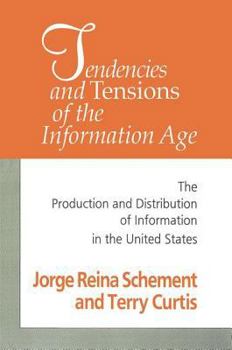Tendencies and Tensions of the Information Age: Production and Distribution of Information in the United States
Select Format
Select Condition 
Book Overview
The development of technology and the hunger for information has caused a wave of change in daily life in America. Nearly every American's environment now consists of cable television, video cassette... This description may be from another edition of this product.
Format:Paperback
Language:English
ISBN:1560009284
ISBN13:9781560009283
Release Date:January 1995
Publisher:Routledge
Length:294 Pages
Weight:0.65 lbs.
Dimensions:0.6" x 5.4" x 8.2"
Customer Reviews
1 rating
An important contribution to information society studies
Published by Thriftbooks.com User , 26 years ago
When, in 1983, the authors of this erudite volume began to reflect on the concept of the information society, they noted that its `high visibility1 was belied by its `indistinct content as an academic concern1. The concept was to become even more prominent over the next few years, to the extent that it became spoken of as a new paradigm, a new way of interpreting the social world. Regrettably, confusion over the nature of the information society did not diminish: if anything, it increased. In Tendencies and Tensions of the Information Age: The Production and Distribution of Information in the United States, however, Jorge Schement and Terry Curtis have done much for the cause of disambiguation. Schement and Curtis understand that the chief methodological issue, the question which must be settled before anything else can intelligently be said, is: should the information society be construed as a post-industrial society or as an extension of industrial society? They favour the latter, arguing forcefully that the information society is not the aftermath of any sudden `information revolution1 but rather a protracted outplaying of the forces which have shaped Western industrialisation. The idea of a socio-economic change on a par with the industrial revolution was always counter-intuitive. Schement and Curtis provide our intuitions with some empirical succour by demonstrating that the United States began the transition to an information-based work force as far back as the 1920s and 1930s. This upsets the orthodox chronology laid down by Fritz Machlup and Marc Porat and, if correct, relocates the information society safely inside the industrial era.Although it has exerted the greatest influence, post-industrialism is not the only variant of the information society thesis. Another emphasises the expansion of information flows in modern societies, especially those utilising the mass media. In a chapter entitled `media environments1, Schement and Curtis present statistics of the popular consumption of information goods, discuss methods of coping with information overload, and explore the implications of the information explosion for the theory of alienation. `For the first time in human history1, they conclude, `a strategy of information exclusion has become urgent1. This sounds quixotic and even heretical, but may indeed be our most realistic option.A third version of the information society thesis has as its focus the microelectronics revolution which has been unfolding since the 1970s. Here it is the computer, not the economy or the communications media, which plays the leading role. In an enthralling essay on `technological visions1, Schement and Curtis approach information technology from various angles, as `fact of life1, as `pursuit of an ideal1, as `sword of Damocles1, as `metaphor1. Their philosophy of technology also makes room for a sophisticated stance on the much-contested issue of technological deter





